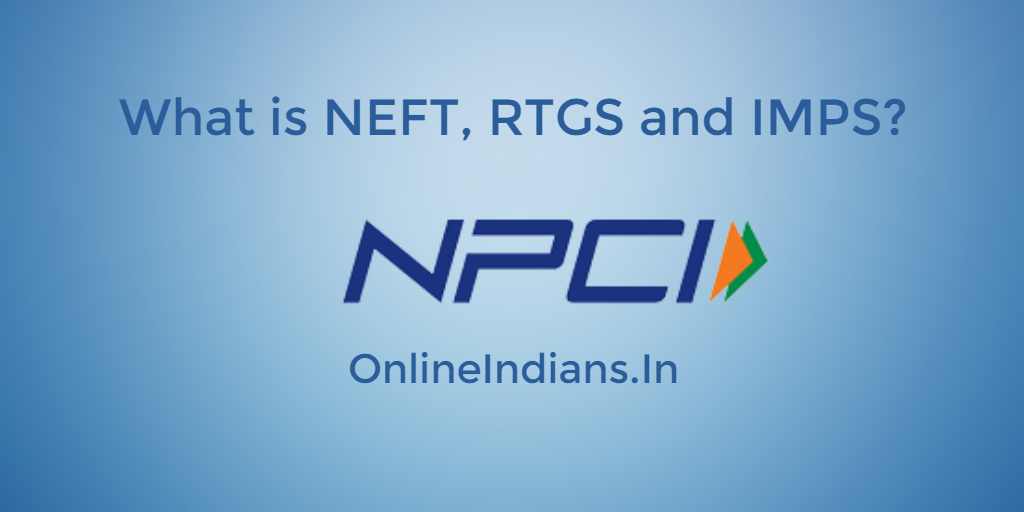The banking system in India is very advanced these days we are getting many features from the banks like Mobile banking, Debit cards, and internet banking. With internet banking we can do many banking tasks online from home we can transfer money from one account to another and do many more things. But internet banking is mostly used to make payments to merchants online and transfer money. When it comes to transferring money we come across some terms like NEFT, RTGS, and IMPS, wondering what these are? If so then I will tell you everything you need to know about NEFT, RTGS, and IMPS.
Basically, these three are electronic payment modes in India with which we can send money or transfer money from our bank account to another bank account. I will tell you the timings at which these three electronic payments work, what are the maximum limits and the charges which are involved in NEFT, RTGS, and IMPS fund transfers.
What is NEFT, RTGS, and IMPS?
NEFT: It is an acronym for National Electronic Fund transfer and is used widely in India when you transfer money from your bank account to another bank account using NEFT the money is not instantly transferred because NEFT can’t transfer money in real time. It is done in batches it is done in a cycle of 60 minutes, the NEFT transactions are done is every 60 minutes. I will tell you the timings in further part of this article.
RTGS: It is an acronym for Real Time Gross Settlement as the name of RTGS says it is a realtime process which means if you use this to transfer money then the money will be instantly credited to the account to which you send the money. There are no cycles involved in RTGS but yes there is a settlement time within which the payments are done I have mentioned the settlement timings below.
IMPS: It is an acronym for Immediate Payment Service which was introduced by NPCI (National Payments Corporation of India) in the year 2010. With IMPS you can transfer the money in realtime 24×7 you can use this mode of money transfer at any time there is no settlement time involved in IMPS.
Timings of NEFT, RTGS, and IMPS
So now you know about these three electronic payment modes which are used in India now let me tell you the timings.
NEFT Settlement Timings.
| Day | Timing | No.of settlements |
| Monday – Friday | 8 AM to 7PM | 12 |
| Saturday | 8 AM to 1 PM | 6 |
| Sunday | Service will be unavailable | Service will be unavailable |
The transfer starts at 8 AM and ends at 7 PM on Monday to Friday and on Saturday you can use this payment mode between 8 AM to 1 PM.
RTGS Settlement Timings.
| Days of the Week | Start Time | End Time |
| Monday to Friday | 09:00 hrs | 16:30 hrs |
| Saturday | 09:00 hrs | 13:30 hrs |
| Sunday | Service will be unavailable | Service will be unavailable |
RTGS is a realtime payment mode which means if you transfer money on 9:30 AM then the money will be credited to your beneficiary account within next 5 minutes. You can use this payment mode between the timings mentioned in the table above.
IMPS Settlement Timings.
IMPS is a realtime payment mode which can be used 24 x 7 which means you can use this payment mode to transfer money even on Sunday, whereas you can’t use NEFT and RTGS on Sundays.
Transaction Limits of NEFT, RTGS, and IMPS
Now I will tell you about the transaction limits of NEFT, RTGS, and IMPS.
NEFT: There is no limit applied on NEFT payment mode you can transfer any amount from Rs. 1 to how much you want. So there is no minimum or maximum transaction limit for NEFT.
RTGS: When it comes to RTGS there is no maximum transaction limit applied but there is a minimum limit of Rs. 2 lakh. Reserve Bank of India applied this limit to RTGS to avoid misuse of this service, so you can use RTGS to make big transactions only.
IMPS: For IMPS there is no minimum transaction limit but the maximum transaction limit depends on your bank and the mode of payment you are using.
Transaction Charges for NEFT, RTGS, and IMPS
NEFT transaction charges:
| Limit | Transaction Charges |
| Rs. 10,000 | Rs 2.50 + ST |
| Rs. 10,000 to Rs. 1 Lakh | Rs 5 + ST |
| Rs. 1 Lakh to Rs. 2 Lakh | Rs 15 + ST |
| Rs. 2 Lakh to Rs. 5 Lakh | Rs 25 + ST |
| Rs. 5 Lakh to Rs. 10 Lakh | Rs 50 + ST |
RTGS transaction charges:
| Limit | Transaction Charges |
| Rs. 2 Lakh to Rs. 5 Lakh | Rs. 25 + ST |
| R. 5 Lakh to Rs. 10 Lakh | Rs. 50 + ST |
IMPS transaction charges:
| Limit | Transaction Charges |
| Rs. 10,000 | Rs. 2.5 + ST |
| Rs. 10,000 to 1 Lakh | Rs. 5 + ST |
| Rs. 1 Lakh to Rs. 2 Lakh | Rs. 15 + ST |
So these are the differences between NEFT, RTGS, and IMPS in the timings, transaction limits and timings. I hope you liked this article and do share your opinion about this article in the comment section below. But please make sure you verify the charges from your bank before you make any kind of transactions using these three electronic payment modes.
